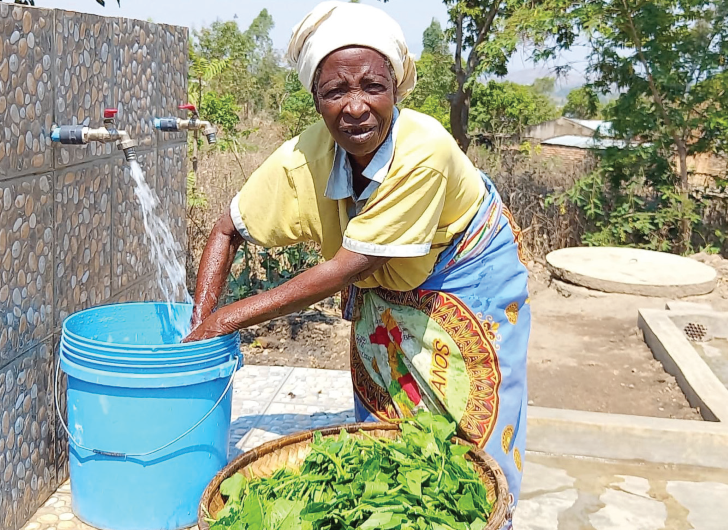Clean water brings smiles in Chiradzulu
As drops of water drip steadily from a tap, 81-year-old Eggrey Mangulama gets excited.
Born on January 11 1941, she smiles as she places her cup below the tap to access the precious commodity.

The sound of the water splashing in her old rusty cup makes her even more excited as she grins from ear to ear.
Soon after that, she grabs vegetables placed in a sieve nearby and starts washing them while whistling.
“Accessing such safe water feels like Heaven to me because access to safe and clean water has been a challenge in recent years.
“I never thought that someday I would be able to drink such clean water,” she says.
The smile on Mangulama’s face, who hails from Maleka Village in Traditional Authority Likoswe in Chiradzulu District, simply underscores the value of accessing such clean and safe water.
The United Nations (UN) states that access to safe water, sanitation and hygiene is the most basic human need for health and well-being.
This perhaps explains why the UN globally advocates for availability and sustainable management of water and sanitation by 2030 as per its Sustainable Development Goal (SDG) number Six.
For Mangulama, she believes that safe and clean water is life itself.
She says that for decades, she has been denied her right to access safe and clean water which has exposed her to all sorts of diseases.
“Before the coming of the taps, I was using water from unsafe sources, and my grandchildren were fetching it for me, especially as I slowly grew older to this point,” she says.
According to Mangulama, prior to the installation of the taps, her grandchildren would spend three hours fetching her water due to long distances.
She says relief could only come when it was raining as they could use rain water for both washing and drinking.
But the coming in of the taps, according to
PHOTOGRAPHS: LLOYD CHITSULO
LLOYD CHITSULO
News Ana lyst
Mangulama, have been a great relief not only to her, but to an entire village with over 2 000 households.
The taps, which are a few metres from her grass-thatched house, were provided by World Vision in partnership with Water for People under the Chiradzulu Wash for Everyone Project with funding from Anonymous Foundation as part of interventions to ensure that everyone in the district has access to safe and clean water supply.
This is apart from ensuring good sanitation and hygiene practices through construction of disaster resilient and modern toilets benefiting both health facilities and public schools.
Mangulama is a beneficiary of such interventions which are benefiting over 2 000 households.
The safe and clean water Mangulama is accessing is driven by solar-powered systems installed at one of the schemes built with support from Chiradzulu Wash for Everyone Project.
But despite the initiatives being of huge benefit to community members, others take advantage by stealing and selling the taps as well as other equipment.
For instance, at Malabvi Health Centre in the district, chairperson for Nzembele Scheme, Jackson Sambani, states that out of six taps that were installed, three were stolen.
He says they managed to replace two and are remaining with one to be replaced.
He says: “Households pay K600 per month so we used such funds to buy two taps and replaced them. We hope to replace the other tap at the soonest time possible.”
Such situations remain counterproductive considering how much money is annually spent by organisations like Water for People and World Vision to support communities with such initiatives.
For instance, Water for People country director Ulemu Chiluzi states that annually, K4 billion is spent on such initiatives.
This is such a huge cost for others to be stealing from such important initiatives.
Group Village Head Nzembele says she has intensified awareness meetings to sensitise her subjects on the benefits of maintaining and protecting such interventions.
“Despite the fact that there are these awareness meetings more often, we still have such cases of theft. However, I remain optimistic about dealing with this challenge,” says the chief.
According to the UN, one in every three people globally live without water which is causing unnecessary diseases and deaths.
But the UN, however, remains optimistic that concerted efforts and funding will, by 2030, ensure everybody has access to safe and clean water supply; hence, achieving SDG Six.





